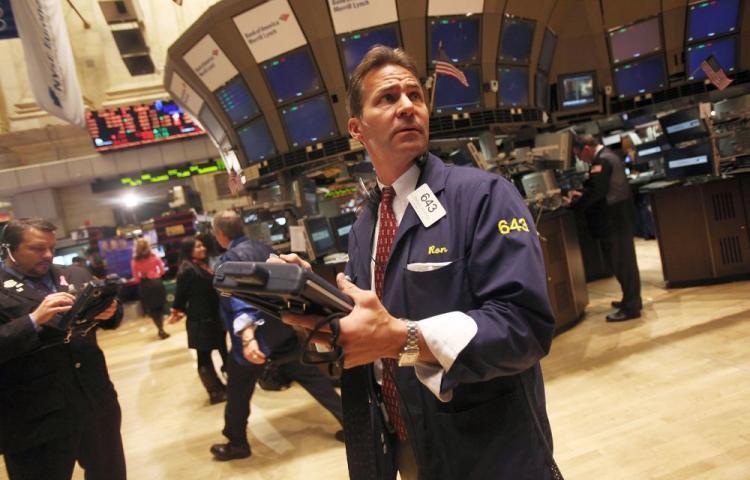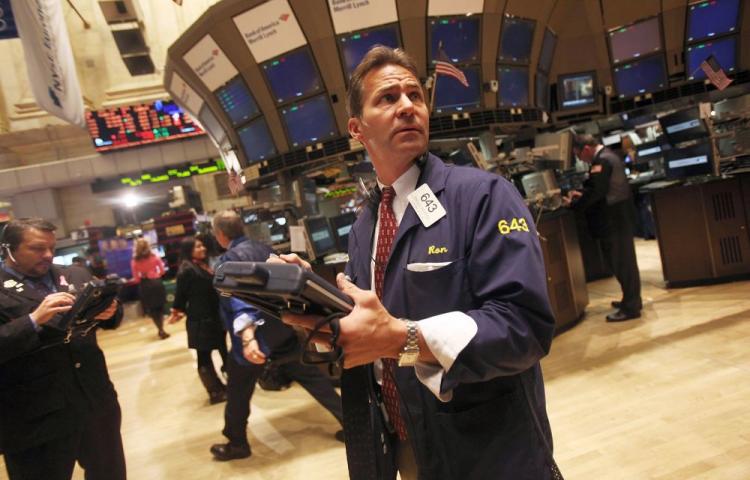NEW YORK—U.S. stocks fell on Monday as investors fretted about a burgeoning sovereign debt crisis in the eurozone.
The Dow Jones Industrial Average fell 39 points, or 0.4 percent, to 11,052 on Monday afternoon although it was as low as 10,929 in the early going. The broader S&P 500 Index declined 1.6 pointes, or 0.1 percent, while the technology-heavy Nasdaq Composite was off 9 points, or 0.4 percent.
On Sunday, The International Monetary Fund and the European Union approved a bailout to shore up the finances of Ireland’s government-owned banks, but investors around the world were fearful that the bailout would not resolve the EU’s woes.
Speculation on contagion effects drove up the credit default swaps—a type of insurance against default—of Spanish and Portuguese bonds, and currency traders drove down the valuation of the euro currency, which fell 1.1 percent against the U.S. dollar.
Earlier in the day, European shares ended their trading sessions markedly lower. The DAX index in Frankfurt lost 2.2 percent, and the FTSE 100 in London declined 2.1 percent.
In the United States, reports of strong retail sales after Black Friday weekend failed to sooth investors concerned about consumer spending, the economy, and high unemployment rates.
Although the National Retail Federation announced that spending over Black Friday weekend was higher than 2009 by a healthy margin, investors battered retail stocks. Other reports about consumer spending drove down share prices of Coca-Cola Co. and Hewlett-Packard Co., the two biggest losers in the blue chip Dow Jones Industrial Average.
Financial stocks did well, with Citigroup Inc. and Bank of America Corp. shares ending their trading day higher. E-commerce giant Amazon.com Inc. also saw its shares increase 1 percent in heavy trading.
The Dow Jones Industrial Average fell 39 points, or 0.4 percent, to 11,052 on Monday afternoon although it was as low as 10,929 in the early going. The broader S&P 500 Index declined 1.6 pointes, or 0.1 percent, while the technology-heavy Nasdaq Composite was off 9 points, or 0.4 percent.
On Sunday, The International Monetary Fund and the European Union approved a bailout to shore up the finances of Ireland’s government-owned banks, but investors around the world were fearful that the bailout would not resolve the EU’s woes.
Speculation on contagion effects drove up the credit default swaps—a type of insurance against default—of Spanish and Portuguese bonds, and currency traders drove down the valuation of the euro currency, which fell 1.1 percent against the U.S. dollar.
Earlier in the day, European shares ended their trading sessions markedly lower. The DAX index in Frankfurt lost 2.2 percent, and the FTSE 100 in London declined 2.1 percent.
In the United States, reports of strong retail sales after Black Friday weekend failed to sooth investors concerned about consumer spending, the economy, and high unemployment rates.
Although the National Retail Federation announced that spending over Black Friday weekend was higher than 2009 by a healthy margin, investors battered retail stocks. Other reports about consumer spending drove down share prices of Coca-Cola Co. and Hewlett-Packard Co., the two biggest losers in the blue chip Dow Jones Industrial Average.
Financial stocks did well, with Citigroup Inc. and Bank of America Corp. shares ending their trading day higher. E-commerce giant Amazon.com Inc. also saw its shares increase 1 percent in heavy trading.






